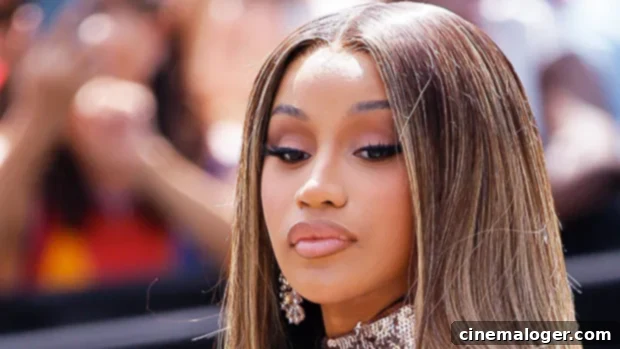Cardi B Cleared: Las Vegas Police Drop Charges in Viral Microphone Incident
Less than one week after a high-profile incident where rapper Cardi B threw a microphone at an audience member during a Las Vegas concert, law enforcement officials have announced that she will not face charges. The decision, revealed by the Las Vegas Metropolitan Police Department on August 3, brings an official close to an event that sparked widespread debate and dominated social media headlines, highlighting the intense scrutiny celebrity actions face in the public eye.
The incident occurred on July 29, captivating millions after footage of the 30-year-old artist’s reaction to an unexpected projectile from the crowd went viral. Following a concert-goer tossing an unknown liquid at her while she was performing, Cardi B immediately retaliated by throwing her microphone into the audience. While initially named a suspect for battery on July 31, police officials ultimately concluded the investigation citing “insufficient evidence.” This development allows the “I Like It” hitmaker to move past the controversy without facing legal repercussions, although the event itself has already become a significant moment in her career narrative.

The Viral Moment: What Exactly Happened at the Las Vegas Concert?
The events of July 29 unfolded rapidly during Cardi B’s outdoor performance in Las Vegas. As the Grammy-winning artist engaged with her audience, a seemingly unprovoked action from a concert attendee changed the dynamic of the show. A video widely circulated across platforms like Twitter (now X) and TikTok captured the pivotal moment: while Cardi B was mid-performance, a liquid, later identified as an unknown substance, was abruptly tossed from the crowd, hitting her. Her immediate response was visceral and decisive. Without hesitation, she hurled her microphone directly back into the section of the audience from where the liquid originated, appearing to shout in frustration.
The impact of the microphone was reportedly felt by an “unnamed individual” who, according to the police report obtained by ABC News, was “struck by the microphone on her right shoulder.” The report further detailed that the individual claimed to be “experiencing pain because of this incident and is going to go get medical attention.” This formal complaint led to Cardi B being named a suspect in a battery report, triggering a police investigation that garnered significant public attention and fueled discussions about celebrity-fan interactions at live events.
Police Investigation Concludes: Insufficient Evidence for Battery Charges
Following the widely publicized incident, the Las Vegas Metropolitan Police Department initiated a thorough investigation into the battery allegations against Cardi B. The rapper was identified as a suspect, a standard procedure when a formal complaint is filed regarding an alleged physical altercation. However, after a review of available evidence, including video footage and witness statements, police officials made a definitive announcement on August 3, less than a week after the event.
In their official statement, local authorities confirmed that the case against Cardi B had been closed. The primary reason cited for this decision was “insufficient evidence.” This means that while an incident undeniably occurred, and a complaint was made, the legal threshold for proving battery charges against the artist could not be met. For a battery charge to stick, prosecutors typically need compelling evidence to demonstrate intent and the direct causal link between the action and the alleged harm. In this instance, despite the viral videos, the evidence presented was deemed inadequate to pursue charges. This outcome underscores the complexities of legal proceedings, especially in high-profile cases involving celebrity figures where public perception often precedes legal judgment.
Cardi B’s Response and the Public’s Divided Opinions
In the immediate aftermath of the microphone-throwing incident, Cardi B’s reaction, both on and offline, was closely scrutinized. Far from retreating from the spotlight, the artist seemed to lean into the viral moment. Shortly after the video of the incident began circulating, Cardi B retweeted a post containing the clip, conspicuously captioned, “Jealous A** B****!” This move was widely interpreted as her unapologetic stance on the event, potentially linking it to her then-recent song “Jealousy,” which she had just released with her husband, Offset, on July 28. This direct engagement with the controversy only amplified its reach, sparking a flurry of online discussions.
Jealous Ass Bitch! https://t.co/bPikhCYBYx pic.twitter.com/AUoG7pvtCv
— Cardi B | Updates (@updatesofcardi) July 30, 2023
Public opinion on the incident was sharply divided. Many fans rallied in support of Cardi B, arguing that her reaction was a justified response to a disrespectful act from an audience member. They highlighted the increasing trend of concert-goers throwing objects at performers, citing concerns for artist safety. Others criticized her actions, arguing that a celebrity of her stature should maintain composure and that throwing an object into a crowd could pose a danger, regardless of provocation. The debate underscored broader conversations about fan etiquette, performer responsibility, and the boundaries of interaction in live entertainment settings. The incident became a microcosm of the intense and often volatile relationship between celebrities and their audiences in the digital age.
The Preceding Request: “Throw Me Some Water”
Adding a crucial layer of context to the entire incident, a separate TikTok video emerged on July 31, just two days after the microphone toss, which significantly shifted public perception for many. This clip, which also went viral, showed Cardi B explicitly asking her fans to throw water on her during an earlier part of her performance. In the video, she is heard quipping, “Throw me some water up here, b****, ’cause I’m hot,” followed by, “Give me some water.”
This revelation provided a new perspective on her later reaction. While the original incident involved an “unknown liquid” being tossed at her, which could have been anything from water to a harmful substance, the prior request for water suggested a certain level of comfort or even encouragement for crowd participation involving liquids. This contextual piece of information led many of Cardi B’s fans and even some critics to re-evaluate their initial judgments. Comments flooded social media, with many expressing sentiments like, “Ahhh There’s always more to the story!!!” and “See! Now I understand!” For these individuals, the TikTok video offered an explanation, suggesting that while the reaction was extreme, it might have been fueled by a misinterpretation of a fan’s intentions or a perceived betrayal of trust, especially if the liquid thrown was not water as she had requested earlier.
Brushing Off the Drama: Cardi B and Offset’s Post-Incident Poise
Despite the legal drama and the whirlwind of public attention surrounding the microphone incident, Cardi B and her husband, Offset, appeared remarkably unphased. Just two days after the incident and on the same day police named her a suspect, the couple shared a video that projected an image of composure and indifference to the controversy. On July 31, they posted a video on social media featuring the 30-year-old artist twerking on Offset while sporting a vibrant red/orange bikini. The caption accompanying the clip, “What happens in Vegas,stays [sic] in Vegas,” was a clear nod to the recent events, playfully dismissing the drama.
The now-viral video showcased Cardi and Offset dancing joyfully to their new song, “Jealousy,” while lounging by a hotel’s rooftop pool. This display of public affection and carefree attitude was strategically timed, coming on the heels of not only the microphone incident but also their alleged cheating drama that had unfolded just weeks prior to the “Jealousy” release. Offset, 31, had recently admitted that he had embellished the truth regarding the cheating allegations against his wife, stating he was “lit” when he made those claims. This pattern of public drama followed by a united front has become a characteristic of the couple’s narrative, suggesting a deliberate strategy to navigate controversies while maintaining control over their public image and promoting their latest musical endeavors. Their ability to seemingly pivot from controversy to promotion underscores their mastery of the modern celebrity landscape.
Broader Implications: Celebrity Safety, Fan Etiquette, and the Digital Age
The Cardi B microphone incident, while specific in its details, opens a broader dialogue about several critical issues affecting the entertainment industry today. Firstly, it reignites concerns about celebrity safety on stage. In an era where performers are increasingly accessible through social media, the boundaries between artist and audience have become blurred, sometimes leading to dangerous interactions. The act of throwing objects at artists—whether liquid or solid—is a serious breach of concert etiquette and poses a genuine threat, prompting many to argue for enhanced security measures and stricter penalties for disruptive fan behavior.
Secondly, the incident spotlights the evolving dynamics of fan etiquette. While a performer might encourage interaction, there remains a fundamental expectation of respect and safety. The line between enthusiastic engagement and unacceptable disruption is increasingly thin, placing both artists and venues in challenging positions. This event serves as a stark reminder that while stars often project an image of invincibility, they are still vulnerable to the actions of individuals in their audience, and their reactions, however spontaneous, can have real-world consequences, both legal and reputational.
Finally, the rapid virality and subsequent discourse surrounding the incident highlight the profound impact of social media in amplifying such events. A moment that once might have been confined to local news or fan anecdotes now explodes globally within minutes, shaping public narratives and influencing legal processes. Social media platforms become both the stage for the incident’s unfoldment and the arena for its dissection, allowing for immediate public judgment, contextual revelations (like the “throw water” TikTok), and the swift closure of official investigations. This phenomenon underscores how digital channels have irrevocably transformed the relationship between celebrity actions, public perception, and official accountability in the modern world.
Conclusion: A Swift Resolution to a Viral Confrontation
The decision by Las Vegas police to drop charges against Cardi B for the viral microphone-throwing incident marks a swift and definitive resolution to a highly publicized confrontation. While the footage of the rapper’s immediate reaction to a fan tossing liquid at her ignited a firestorm of debate and saw her named as a battery suspect, the lack of sufficient evidence ultimately precluded any legal action. This outcome allows Cardi B to sidestep formal legal consequences, though the event has undoubtedly etched itself into the annals of celebrity concert controversies.
Beyond the legal aspects, the incident has served as a potent catalyst for discussions surrounding performer safety, fan responsibility, and the ever-present influence of social media in shaping public narratives. It underscored the volatile nature of live performances and the fine line between passionate fan engagement and inappropriate conduct. As Cardi B and Offset playfully brushed off the drama, the episode stands as a testament to the complex interplay of celebrity, public expectation, and the often-unpredictable moments that define contemporary fame.
